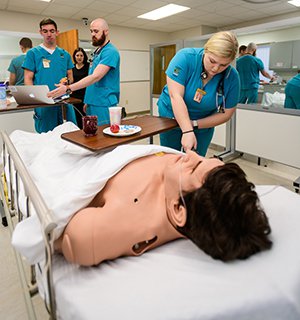Investments in both faculty and infrastructure for Emporia State’s Department of Nursing will benefit current and future students as well as supply much-needed, highly trained nurses for the state of Kansas. The investments come as Emporia State University continues to elevate and reimagine its future.
The department will offer two additional programs:
- RN to BSN, an online program for those already working as registered nurses who want to add a bachelor’s degree in nursing; and
- MSN, an online master of science in nursing program.
Three faculty positions will be added to the department to meet the demand of all programs offered by the department. Emporia State University is finalizing plans to move the program to the academic campus in fall 2025.
Currently, the ESU nursing program, which this year is celebrating 100 years of educating nurses, can accept up to a total of 100 undergraduate students each year in two cohorts. These students graduate with a bachelor of science degree in nursing (BSN) and will be registered nurses after passing a national licensing examination. Graduates of Emporia State’s BSN program show a 92% average passage rate on the NCLEX exam over the last five years, compared to 85.6% for the state of Kansas and 86.5% nationally.
“The profession of nursing is in dire need of qualified, competent and reputable nurses, and our department’s success over the last 100 years has proven our ability to produce top quality nurses from our program,” said Karly Lauer, ESU assistant professor of nursing. “With the help from the university and the recent strategic plan, we are eager to continue to grow our program and have more resources and opportunities for teaching and learning.”
“Communities all across Kansas benefit from the nurses and healthcare workers who graduate from our higher education system,” said Kansas Board of Regents Chair Jon Rolph. “Emporia State’s investment in its nursing program as well as the other investments being made align with the Regents’ priorities as these plans support students and help meet critical workforce needs in our state.”
Cory Falldine, ESU vice president for infrastructure, explained the planned move to the ESU campus.
“Our goal has been to create the most effective space possible for the Department of Nursing programs,” said Falldine.
Emporia State received $5 million from the State of Kansas for the move from the Newman Regional Health campus in Emporia onto the academic university campus. The ESU Foundation will also be a critical partner as the university moves toward funding the construction of a new, best-in-class space.
Originally, that move was anticipated into a vacant residence hall on campus that would be renovated. Additional research with nursing faculty and partnering architects, Falldine said, moved the university to pursue a new building instead.
“Residence halls are built to be residence halls,” he said. “Renovating that type of space into classroom spaces and simulation labs would be simply ‘making things work.’ We have an opportunity to think bigger picture and longer term. For Emporia State University, it is time to move beyond just making things work to enhancing cost efficiency for our nursing program, and our campus, into the future.”
The end result, Falldine said, will be a building that will provide a more innovative and effective space for nursing programs five, 10 and 20 years down the road.
“Our longstanding partnership with Emporia State University has fostered a stream of quality nurses into our healthcare system,” said Cathy Pimple, Newman Regional Health chief administrative officer. “Newman Regional Health values the opportunity to support the education and clinical training of nursing students and employ new graduates into our community hospital.”
Newman Regional Health is one of many hospitals of all sizes with clinical relationships with ESU. Others include the University of Kansas Medical Center in Kansas City, Kansas; Wesley Medical Center in Wichita and Stormont Vail in Topeka.
According to Pimple, registered nurse positions in Kansas comprise the majority of job postings in health care, with 46 days the average amount of time to fill a vacancy.
For more information about Emporia State’s reinvestments in academic programs, see emporia.edu/future, which includes a video from Karly Lauer, assistant professor of nursing.

